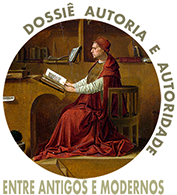The construction of auctoritas in Gratian's Decretum: the role of tradition and the auctor in a 12th century legal text
DOI :
https://doi.org/10.11606/issn.2316-9141.rh.2022.181491Mots-clés :
Authority, Medieval canon law, Gratian, Authorship, Legal textsRésumé
This paper discusses the construction of authority in the 12th century using a specific case, that of Gratian’s Decretum, a legal manual compiled around 1140 in Western Europe. Through a methodology of intertextual analysis, this article combines theoretical work from major authors and primary sources to advance an explanation on how authority can be understood during the central Middle Ages in legal texts and how it comes from an articulation between tradition and originality. Furthermore, we highlight how the intersections between innovation and tradition in the Decretum make it possible for us to consider Gratian as an auctor. From this analysis, we extrapolate a broader conclusion about how legal texts in the 12th and 13th centuries used and then recreated a notion of authority that came to include the idea of the author who, in his turn, became an authority himself.
##plugins.themes.default.displayStats.downloads##
Références
Primary sources:
GRATIAN. Decretum, Available at:
<https://geschichte.digitale-sammlungen.de//decretum-gratiani/online/angebot> Access on 10/01/2021.
GRATIAN. Decretum Gratiani, first recension, edition in progress, WINROTH, Anders (ed.) Available at: gratian.org. Access on 8/12/2020.
GRATIAN. Treatise on Laws. Washington: Catholic University of America, 1993.
Secondary sources:
ALLEN, Graham. Intertextuality. London-New York: Routledge, 2000.
BOLTON, Brenda; MEEK, Charles. Aspects of Power and Authority in the Middle Ages. Turnhout: Brepols, 2007.
BRUNDAGE, James. Medieval Canon Law. London and New York: Longman, 1995.
BRUNDAGE, James, A. The Medieval Origins of the Legal Profession. Canonists, Civilians, and Courts. Chicago: University of Chicago Press, 2008.
CHRISTENSEN, Katherine. Introduction. In: GRATIAN. Treatise on Laws. Washington: Catholic University of America, 1993.
DEANSLY, Margaret, A History of the Medieval Church 590-1500. London & NY:
Routledge, 1994.
GAUDEMET, Jean. Contribution à l’étude de la loi dans la doctrine canonique du XIIe siècle. La Formation du droit canonique médieval. London: Variorum, 1980.
HARTMANN, Wilfried; PENNINGTON, Kenneth. (eds.). The History of Medieval Canon law in the Classic Period, 1140-1234: from Gratian to the Decretals of Pope Gregory IX. Washington D.C.: Catholic University of America Press, 2008.
HASKINS, Charles Homer. The Renaissance of the Twelfth Century. Cambridge: Harvard University Press, 1990.
KUTTNER, Stephan. On ‘auctoritas’ in the writing of medieval canonists: the vocabulary of Gratian. Studies in the History of Medieval Canon Law. London: Variorum, 1990.
LANDAU, Peter. “Gratian and the Decretum Gratiani”. In: HARTMANN, W.; PENNINGTON, K. (ed.). The History of Medieval Canon law in the Classic Period, 1140-1234: from Gratian to the Decretals of Pope Gregory IX. Washington D.C.: Catholic University of America Press, 2008.
MERRIAM-WEBSTER Online Dictionary. “Authority”. Disponível em: <https://www.merriam-webster.com/dictionary/authority>. Acesso em 25/01/2021.
MERTON, Robert. On the Shoulders of Giants. Chicago: University of Chicago Press, 1965.
MINNIS, Alastair. Medieval Theory of Authorship. Scholastic Literary Attitudes in the Later Middle Ages. Philadelphia: University of Pennsylvania Press, 2nd edition, 2010.
MIRAMON, Charles de. La mutation de l’enseignement du Décret de Gratien à Bologne à la fin du XIIe siècle. DEMOULIN-AUZARY, Florence; LAURENT-BONNE, Nicolas; ROUMY, Frank (Orgs.). Proceedings of the Fifteenth Congress of Medieval Canon Law. Vatican: Biblioteca Apostolica Vaticani, forthcoming.
MÜLLER, Wolfgang. P.; SOMMAR, Mary E. (ed.), Medieval Church Law and the Origins of the Western Legal Tradition: a tribute to Kenneth Pennington. Washington D.C.: The Catholic University of America Press, 2006.
NOONAN, John T. Gratian slept here: the changing identity of father of systematic study of canon law. Traditio. vol. 35, 1979.
PENNINGTON, Kenneth. Western legal collections in the twelfth and thirteenth centuries. In: BEREND, Nora; HAMEAU-MASSET, Youna; NEPO-PEKELMAN, Capucine; TOLAN, John. Religious minorities in Christian, Jewish and Muslim Law (5th-15th centuries). Turnhout: Brepols, 2017.
SILVA, Carolina Gual. Sobre direito e normas na Idade Média: do pluralismo à multinormatividade. Signum. Vol. 21, n. 1, 2020.
SILVA, Carolina Gual. Tithes and equity: where Canon Law meets Theology. DEMOULIN-AUZARY, Florence; LAURENT-BONNE, Nicolas; ROUMY, Frank (Orgs.). Proceedings of the Fifteenth Congress of Medieval Canon Law. Vatican: Biblioteca Apostolica Vaticani, forthcoming.
WINROTH, Anders. The Making of Gratian’s Decretum. New Haven: Yale University Press, 2000.
ZIOLKOWSKI, Jan. Cultures of authority. The Journal of English and Germanic Philology, vol. 108, n. 4, 2009.

Téléchargements
Publiée
Numéro
Rubrique
Licence

Ce travail est disponible sous licence Creative Commons Attribution - Pas d’Utilisation Commerciale 4.0 International.
Autores que publicam nesta revista concordam com os seguintes termos:
- Autores mantém os direitos autorais e concedem à revista o direito de primeira publicação, com o trabalho simultaneamente licenciado sob a https://creativecommons.org/licenses/by/4.0/ (CC BY). Esta licença permite que outros distribuam, remixem, adaptem e criem a partir do seu trabalho, mesmo para fins comerciais, desde que lhe atribuam o devido crédito pela criação original. É a licença mais flexível de todas as licenças disponíveis. É recomendada para maximizar a disseminação e uso dos materiais licenciados.
- Autores têm autorização para assumir contratos adicionais separadamente, para distribuição não-exclusiva da versão do trabalho publicada nesta revista (ex.: publicar em repositório institucional ou como capítulo de livro), com reconhecimento de autoria e publicação inicial nesta revista.
- Autores têm permissão e são estimulados a publicar e distribuir seu trabalho online (ex.: em repositórios institucionais ou na sua página pessoal) a qualquer ponto antes ou durante o processo editorial, já que isso pode gerar alterações produtivas, bem como aumentar o impacto e a citação do trabalho publicado (veja O Efeito do Acesso Livre).
Comment citer
##plugins.generic.funding.fundingData##
-
Fundação de Amparo à Pesquisa do Estado de São Paulo
##plugins.generic.funding.funderGrants## 2017/20683-6






